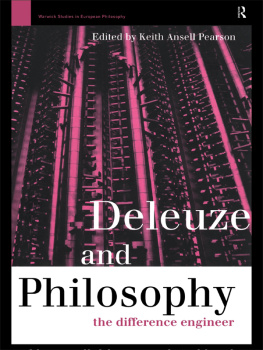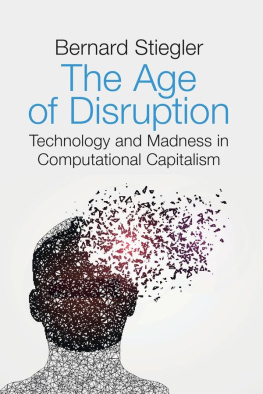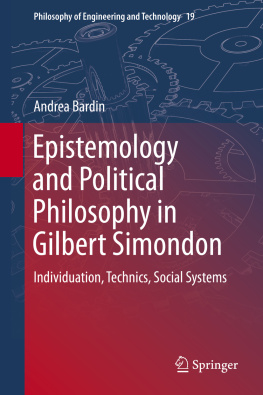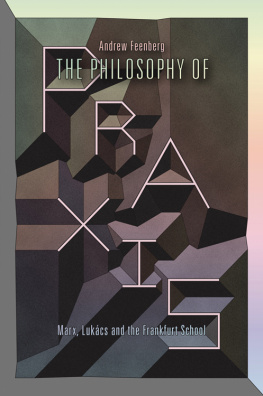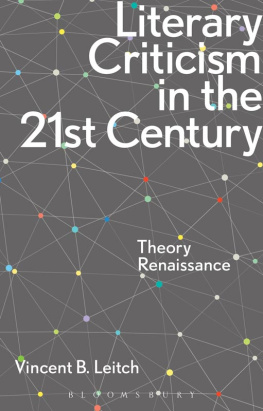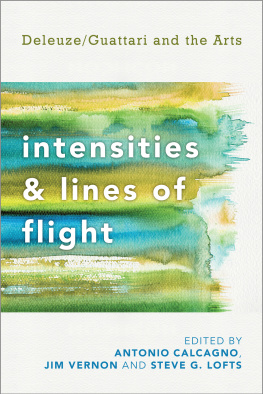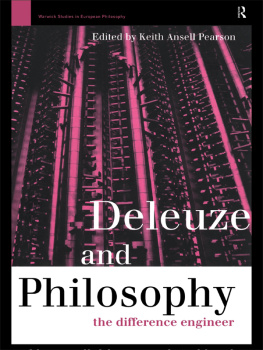TECHNICITY
edited by
ARTHUR BRADLEY
&
LOUIS ARMAND
Litteraria Pragensia
Prague 2006
Copyright Arthur Bradley & Louis Armand, 2006, 2013
Copyright of individual works remains with the authors
Published 2006 by Litteraria Pragensia
Centre for Critical & Cultural Theory
Faculty of Philosophy, Charles University
Nmst Jana Palacha 2, 116 38 Prague 1
Czech Republic
All rights reserved. This book is copyright under international copyright conventions. Apart from provisions made under Fair Use, no part of this book may be reproduced, stored in a retrieval system, or transmitted in any form, electronic, mechanical, photocopying, recording or otherwise, without prior written permission from the copyright holders. Requests to publish work from this book should be directed to the publishers.
Design by lazarus
Contents
Bernard Stiegler
Louis Armand
Arthur Bradley
Christopher Johnson
Hartmut Winkler
J. Hillis Miller
Belinda Barnet
Darren Tofts
Geert Lovink (with Kenneth C. Werbin)
McKenzie Wark
Donald F. Theall
Niall Lucy
Laurent Milesi
Michael Greaney
Mark Amerika
Introduction
Thinking Technicity
Now, since the soul is immortal and has come to be many times and has seen both the things here and those in Hadesin fact all thingsthere isnt anything it hasnt learned. As a result, its being able to recollect what pertains to virtue and other things is nothing to be wondered at, since it also knew them all previously. For, nature as a whole being akin and the soul having learned all things, nothing prevents someone, once he has recollected just one thingwhat human beings call learningto discover all else, if he is courageous and doesnt grow weary in the search. For searching and learning as a whole are recollection [ anamnsis ].
In the Meno and other texts, Plato institutes a now infamous opposition between the Socratic recollection of the immortal soul, called (anamnsis), and the artificial or technical supplement to memory, called (hypomnsis). It is with this entirely unprecedented opposition that western metaphysics and, arguably, western philosophy more generally, comes into existence. To Platos way of thinking, thought is nothing other than the act of the immortal soul remembering itself once again. On the one side, then, we have thought, the infinite, the transcendental and something called philosophy. On the other, however, we have artifice, finitude, the empirical and something called technicity. Yet what happens to the finite worldwith all its inherent contingency, variability and fallibilitywhen the immortal soul recollects itself? If thought is defined as the recollection of immortality, then finitude, contingency and technology are, as Bernard Stiegler has argued, thereby consigned to the darkness of the unthought: true anamnsis apparently has no need of the sophistical or technical supplement that is hypomnsis. What, though, might it mean to think this unthought, that is to say, technicity itself?
It is usually Aristotle, rather than Plato, who is credited with inventing the philosophy of technology in the modern sense of the term. As was the case with Plato, he institutes a hierarchy between theoretical (epistm) and practical thought or knowledge (techn): the Metaphysics and the Nicomachean Ethics , for instance, consistently distinguish between philosophical knowledgewhich is an end in itselfand technical or craft-knowledgewhich is merely a means to an end. However, Aristotle is also the first thinker to construct an ontology of the technical object. To Aristotles eyes, techn is an essentially inert, neutral tool whose status is entirely determined by the use to which it is put by human beings. If nature (physis) contains the principal of its own motionan acorn will grow into an oak tree all by itselfthe same is obviously not true for a technical or fabricated object: an oak table or bed frame requires an efficient cause (causa efficiens) such as an artisan to bring it into being. In this way, we arrive at an idea of technicity that has dominated philosophy for almost 3,000 years: techn is a prosthesis (: pro - thesis , i.e., an addition; what-is-placed-in-front-of) considered in relation to nature, humanity or thought; one that can be utilised for good or ill depending upon who or what happens to wield it.
Yet, as the essays in this collection will show, it is precisely this concept of technicityas tool, instrument or prosthesisthat now most urgently needs to be re-thought. It is something of a clichbut no less trueto say that developments in contemporary technology have radically transformed our understanding of what it is to be human. As the disciplines of artificial intelligence, genetic engineering and information technology continue to develop at a bewildering pace, the ontological boundaries between the human and the technological constantly need to be re-drawn: what we used to think of as the defining properties of human beingmind, agency, affect, consciousness, the very operation of thought itselfare revealed to be inextricably bound up with complex, quasi-mechanical and technically replicable processes. Man today is less homo cogitans than what Hans Holstein termed homo cyberneticus. To put it crudely, technology in this way appears less an instrumentum of an a priori reason, than an ontological state . Consequently, technicity names something which can no longer be seen as just a series of prostheses or technical artefactswhich would be merely supplemental (or supernumerary) to our naturebut the basic and enabling condition of our life-world. From the watch we wear to the server we log into, we exist pros-thetically, that is to say, by putting ourselves outside ourselves . If the classical opposition and hierarchy between thought and technology can no longer be sustained from this perspectivesuch that what Plato calls anamnsis may be nothing other than a complex repertoire of motor functions, cybernetic loops and self-replicating hypomnesic systemsthen it is clear that this insight poses a new and urgent task for any philosophy of technology. In other words, the question arises as to whether it is possible to think something that is nothing less than the basic condition of thought itself.
To be sure, modern philosophy of technology has supplied many different answers to this questionfrom Marx, through Nietzsche, Freud, Bergson, Husserl, Benjamin, Simondon, Deleuze and Guattari, to Derrida and Stieglerand this conceptual debate forms the backdrop to many of the essays that follow. It was Kostas Axelos who argued that the title of the first penseur de la technique belongs to Karl Marx: historical materialism, he suggested, set in motion the critique of the Aristotelian concept of techn as an essentially inert, neutral prosthesis. If Marxs insight into the mutual implication of the human and the technical is undoubtedly a radical step, it could nevertheless be argued that his political critique of machine capital (whereby the unalienated human subject can emancipate itself from domination by technology) still implicitly assumes the Aristotelian concept of a pre-technological causality without which techn itself would merely be inert matter. In other words, we might argue thatfor all his undoubted radicalityMarx still remains beholden to the metaphysical philosophy of technology: somethinga collective human subject or essencestill exists outside technicity.
It is Martin Heidegger who here takes the more radical step in asserting that the question concerning technology (die Frage nach der Technik) must be posed on an ontological level, framed within a critique of the metaphysics of presence: what begins as an anthropology or social science thus comes to reflect nothing less than the very science of being. Accordingly, and to a certain degree by way of Marx, this scientia or also implies a deconstruction of the logic of presence that has underwritten classical ontology hitherto. The thinking of being by way of technicity, as an operation of technological becoming, brings into view a certain distanciation and mechanical iterability that invests presence, as it were, from the outset. This means that ontology, as a reflection upon being, is above all involved not only with a cognitive object that may be described as technical, but with an operation of reflexivity that could even be described as the very apotheosis of technicity.



